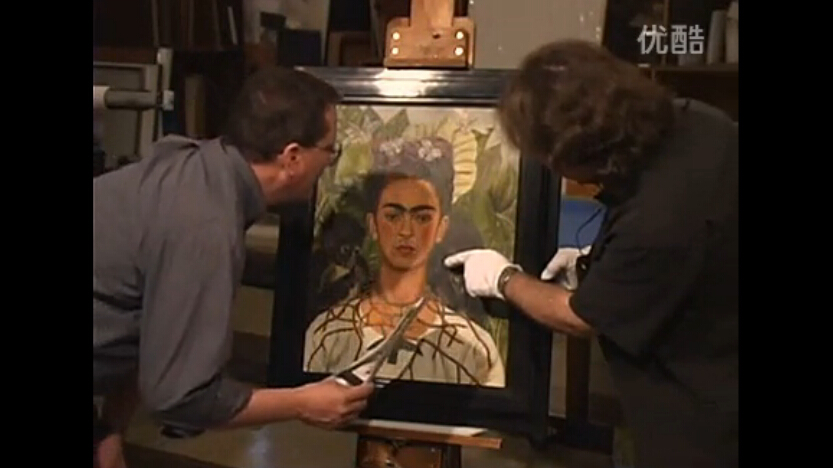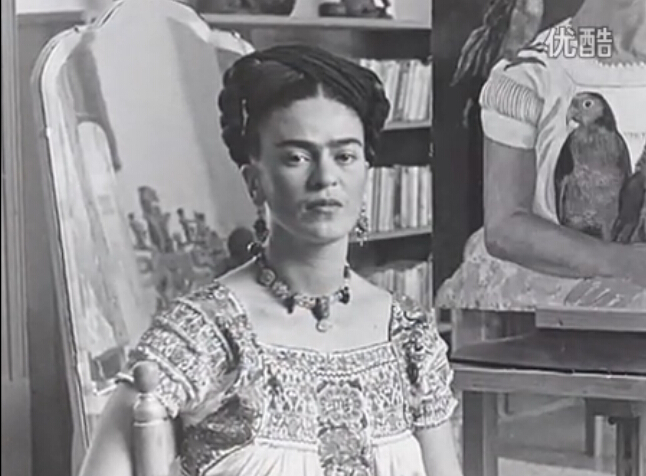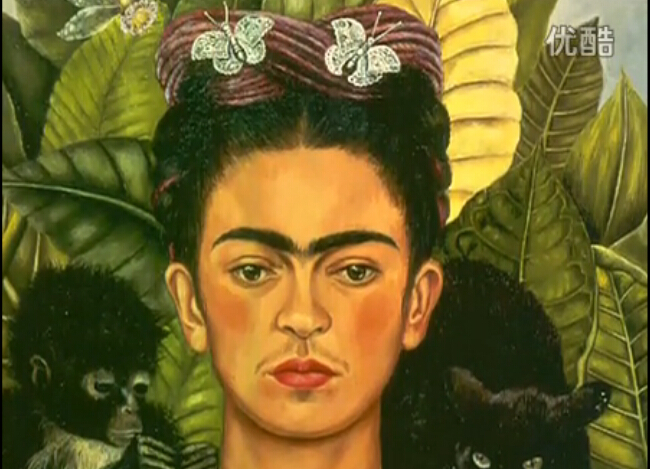We're so pleased to have Frida Kahlo's self-portrait from 1940 back with us here in Austin. Over the last two decades, the self-portrait has traveled the world from New York to Australia, Paris to Barcelona, San Francisco, and right back here to Austin, Texas.
我们很开心能让芙烈达·卡萝1940年的自画像回到我们身边在奥斯汀这。在过去二十年,这幅自画像游遍世界,从纽约到澳洲、巴黎到巴塞隆纳、旧金山、然后就回到德州奥斯汀这儿。

Frida Kahlo, since I've been here, has gone out, I think I had estimated, about 30 times. When we travel the Kahlo, she has a number of restrictions that are put on her. She always travels with a courier from the Ransom Center. If that entails airplane travel, which it generally does, she gets her own seat. She has her own traveling case. The security, of course, at the borrowing institution has to be very stringent. She is very important to the collection, she is a very high value item, and so she gets particular care.
芙烈达·卡萝,自我到这以来,已经出去过,我想我估计,大约已有三十次。当我们运送卡萝时,她有加诸于她的几个限制规定。她总是让Ransom研究中心的运送员运送。如果那包含飞机旅行,通常都有包含,她有她自己的机位。她有她自己的行李箱。当然,在申借机构的保全必须要非常严谨。她对于收藏品来说是非常重要的、她是非常高价值的展品,所以她得到特别照顾。

The role as a courier within the Frida Kahlo painting was to go to El Paso and pick up the painting. After loading the vehicle and preparing it for shipping and bringing home the masterpieces of the Ransom Center, we left El Paso at approximately 8:30 in the morning. The vehicle itself is also not advertising the fact that it is carrying a priceless cargo. It's a very unique truck. It also carries 300 gallons of diesel, so therefore we can drive more than 10 hours without ever stopping.
身为芙烈达·卡萝画作运送员这角色是要前往艾尔帕索接那幅画。在将画放上车、并准备好运送并把这幅Ransom研究中心的杰作带回家后,我们在大约早上八点半时离开艾尔帕索。那车辆并没有宣扬它正载着一幅价值连城的货物这个事实。那是一台非常特殊的卡车。它同样也装有三百加仑的柴油,所以我们可以完全不用停下来驾驶超过十个小时。
Once we arrived, the pieces were immediately brought to the fourth floor and locked. Once the Frida Kahlo painting is unwrapped, then Ken Grant comes in and assesses the work and makes a comparison with the condition report documents.
当我们抵达时,那画作马上被带到四楼并锁住。当芙烈达·卡萝的画作拆封后, Ken Grant 进来并评估那作品,和画作状况报告文件做比对。
The painting itself now is in extremely good condition. And there are only sort of residual condition issues with the painting itself that we make note of, but they're stable. So there's some minor cracking in the paint. Of course, a painting of this age would probably have that sort of condition no matter what.
画作本身现在处于极佳的状态。画作本身只有一点残留的状况问题,我们记下了,但它们是很稳定的。所以这幅画上有几个小小的裂痕。当然,这个岁数的画作不管怎样也许都会有这种状况。

Frida Kahlo's self-portrait is part of a series of works that she did in 1940. There were other self-portraits that she completed that year. What makes this particular work important is not only the subject matter in the work but also the context within which it was created.
芙烈达·卡萝的自画像是她在1940年创作的一系列作品中其中一部分。有其他幅她在那一年完成的自画像。让这幅特殊作品这么重要的事情,不只是作品的题材,还有它被创作出来其中的背景。
It is a wonderfully symbolically rich self-portrait, as well as a work that was created during an important crossroad in Frida Kahlo's life. She had divorced with her husband, the muralist Diego Rivera in 1939, and she broke her love affair with the collector Nickolas Muray in 1940. Later on in 1940 Rivera and Kahlo remarried.
那是完美富含象征性的自画像,也是一幅在芙烈达·卡萝人生中一个重要的转折点所创作出来的作品。她和丈夫壁画家Diego Rivera在1939年离婚,她还在1940年爆出了她和收藏家Nickolas Muray的绯闻。后来在1940年Rivera和Kahlo再婚。
So there is quite a bit going on in her life as well as in the painting itself. And in that painting we see a variety of things: we see Frida Kahlo looking not necessarily at the viewer but out off in the distance as if she were in great or deep thought, the thorn necklace with its religious connotations, and certainly the animals and the flora and fauna of Mexico that surround her create this claustrophobic space.
所以在她人生中以及在画作本身都有相当多的事件发生。在那幅画中我们看到各种东西:我们看到芙烈达·卡萝不一定只是看向观众,而是往远方看出去,好似她处于伟大、或是深沉的思考中、那带着宗教意涵的荆棘项链、以及当然环绕着她的动物与墨西哥动植物群产生这种幽闭恐惧的空间。
The other works in the Kahlo collection include Diego y Yo, which is a wonderful drawing that was created within months after her marriage to Diego Rivera. It was created in California, where and when Rivera was working on his murals in San Francisco.
卡萝藏品的其他作品包括《Diego和我》,那是她在嫁给Diego Rivera几个月中创作出的美妙画作。那是在加州所创作的,就在那时那地Rivera正在旧金山创作他的壁画。
The other work in the collection, a still life from 1951, was essentially a work at the apex of her series of still lifes that she created, the last series of works that the artist created before she died in 1954.
藏品中的另一个作品,一幅1951年的静物画,本质上是她创作的一系列静物画中的颠峰之作,那艺术家在她在1954年逝世前创作的最后一系列画作。
I think we're very fortunate to have three of her pieces here in the collection. So, you know, I'm thrilled to be able to be around Kahlos and I think that the audience that comes to see her is going to be as well.
我认为我们非常幸运在这儿能有她作品中的三幅画作。所以,你知道,我很兴奋能够围绕在Kahlos身旁,我认为前来观赏她的观众们也会很兴奋。
While she only created less than 200 works over her lifetime, really had become at the time, and now is, a complete artist, someone who represents fully her country as well as established a place for herself in the traditions of modern art.
虽然她在她一生中只有创作不超过两百幅的作品,但她确实在当时成为、现在也是,一位完完全全的艺术家,某个完整代表她的国家、并在现代艺术传统中建立她自己地位的艺术家。
It's going to be wonderful. I mean, everybody loves to see this painting. So it's gonna be great. I mean, I'll love to see her up. You know, I only get to see her laying on a table. So it'll be good to see her installed the way she's supposed to be seen. So Frida would be happy.
那会很棒的。我是说,每个人都喜欢看到这幅画。所以那会很棒的。我是说,我会很乐意去看她挂起来展出。你知道,我只能看到她放在桌上。所以去看用她应该被观赏的方式所装置的她会是很棒的。这样芙烈达会很开心的。















